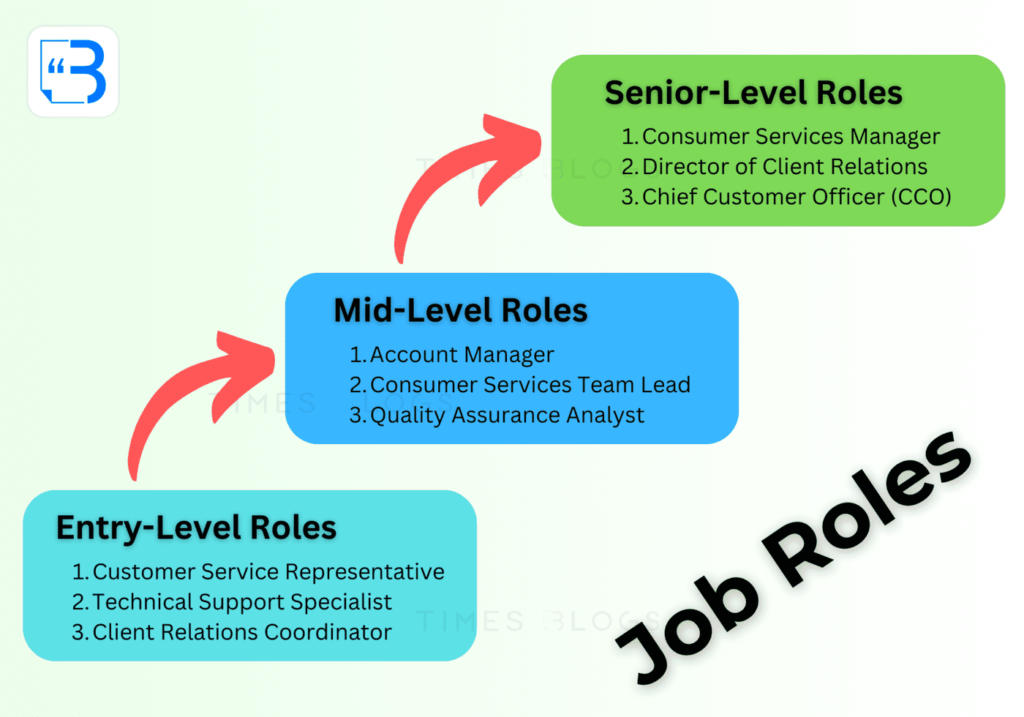Are you at a career crossroads, contemplating whether consumer services could be your ideal path forward? You’re in good company. Many are attracted to the broad spectrum of opportunities that consumer services offer, ranging from the buzzing retail floors and elegant hotel lobbies to the tech-driven spaces of customer support centers and healthcare facilities. However, like any career, it comes with its unique set of challenges and rewards.
In this comprehensive analysis, we’ll peel back the layers on this diverse field to address the critical question, “Is consumer services a good career path?” Through exploring the advantages and drawbacks, scrutinizing job roles and growth potential, and assessing the skills needed, we aim to provide you with the insights you require to make an informed career choice. Whether you’re just starting out or considering a career switch, this guide will equip you with the knowledge you need to determine if consumer services align with your professional goals and personal values.
Table of Contents

1. What is Consumer Services?
As you explore the question, “Is consumer services a good career path?”, it’s essential to first understand what consumer services entail. This sector comprises a wide spectrum of roles and responsibilities aimed at improving the customer’s experience with a brand or company. Traditionally rooted in face-to-face interactions such as retail sales and customer support in physical offices, the consumer services field has undergone a significant transformation with the rise of digital technology.
In today’s interconnected world, consumer services extend well beyond in-person communication. They now encompass digital avenues such as online chat support, email-based customer service, and social media engagement. Whether you are considering a role in a traditional setting or a virtual one, the overarching goal remains the same: to facilitate positive interactions between the company and its customers.
Professionals in this sector serve as the vital connectors that establish trust and encourage ongoing customer loyalty. They assist in the pre-purchase decision-making process, help solve problems after a purchase has been made, and guide consumers through the often complex landscape of choices and options. Their role is instrumental in building and maintaining strong customer relationships, making them key players in any organization’s success.
2. Pros of a Career in Consumer Services
When contemplating your next career move, the question, “Is consumer services a good career path?”, may very well be on your mind. To guide you through this decision-making process, let’s examine the various upsides of choosing a career in consumer services:
Flexibility
The consumer services sector offers remarkable flexibility when it comes to both job roles and industries. One year, you could find yourself engrossed in the cozy ambiance of a local bookstore, while the next year could see you in a bustling office managing customer relations for a tech startup. This breadth of opportunity allows for a dynamic career that keeps you engaged and allows for a broad range of experiences.
Skill Development
Roles in consumer services require a unique blend of soft skills such as communication, problem-solving, and adaptability. These aren’t just essential for succeeding in your current job; they’re transferable skills that can open doors to different career paths and industries. This skill diversity enhances your marketability and can be your ticket to varied career adventures.
Job Satisfaction
Few careers offer the level of immediate gratification and job satisfaction that comes with successfully solving a customer’s problem or helping them make a life-improving choice. The impact of your work is often visible in real-time, providing a constant stream of affirmation that what you’re doing truly matters.
Networking Opportunities
Roles in this field typically involve interacting with professionals across various departments and sometimes even crossing industry boundaries. This network mosaic not only enriches your daily work experience but also furnishes you with connections that can significantly accelerate your career trajectory.
Geographic Mobility
Consumer services roles are globally ubiquitous, meaning you’re not geographically bound in your job search. Whether you have dreams of living in a bustling metropolitan city, a tranquil small town, or even contemplating an international move, a career in consumer services can make these dreams feasible.
Emotional Intelligence Development
Interacting with a diverse clientele on a daily basis doesn’t just challenge your emotional intelligence—it also fosters its development. Emotional intelligence is increasingly becoming a sought-after skill in the modern workplace, making you an even more valuable asset to potential employers.
Stable Career Path
The consumer services field tends to offer greater job stability as the demand for quality customer service is almost recession-proof. No matter the state of the economy, companies will always need competent professionals to manage customer relations, making it a relatively stable career option.
Work-Life Balance
Many roles in consumer services, especially those that have embraced digital transformation, provide flexible working hours or even remote work opportunities. This flexibility enables you to maintain a more harmonious balance between your professional obligations and personal life, a feature that is increasingly becoming a priority for many job seekers.
So, if you’re trying to answer the question, “Is consumer services a good career path?”, taking a closer look at these benefits can offer a comprehensive perspective. With its multifaceted advantages, a career in consumer services not only provides immediate job placements but also serves as a robust platform for long-term career growth and personal development.
3. Cons of a Career in Consumer Services
Let’s explore the other side of the coin. A balanced view is crucial when answering the question, “Is consumer services a good career path?” So, without further ado, here are some factors that could be considered drawbacks:
Repetitive Tasks
Consumer services roles may require you to perform repetitive tasks that might lack intellectual stimulation. Answering similar queries or troubleshooting the same issues day in and day out could become monotonous, potentially leading to job dissatisfaction or burnout over the long term.
Emotional Drain
Yes, helping people can be rewarding, but it can also be emotionally taxing. Customer service roles often involve managing disgruntled or dissatisfied customers, which can strain your emotional reserves, especially if you are naturally empathetic and absorb the emotional states of those around you.
Limited Control Over Work Hours
While the field offers a range of roles with varying levels of flexibility, certain jobs like those in retail or healthcare may require working weekends, holidays, or late hours. This lack of control over your schedule can significantly affect your work-life balance and personal commitments.
Lower Starting Salaries
It’s a reality that many entry-level positions in consumer services may not offer competitive salaries compared to other sectors that demand specialized education or skills. While the potential for earnings can increase with experience, the initial pay scale might be a drawback for some.
Career Stagnation
Advancement opportunities vary, and some individuals may find themselves plateauing in consumer services roles, particularly when employed by smaller organizations that offer limited scope for upward mobility. This stagnation can become a point of frustration if you’re seeking a dynamic career trajectory.
High-Stress Environment
Meeting targets, maintaining high levels of customer satisfaction, and juggling multiple tasks at once can create a stressful work environment. This high-pressure atmosphere might not be a good fit for everyone, particularly those who thrive in more relaxed settings.
Customer Dependent
Your job performance is often intrinsically linked to customer behavior and feedback, elements that you have limited control over. An unfortunate series of negative interactions could not only affect your performance reviews but might also impact your emotional well-being, adding stress to your job.
Less Time for Personal Growth
Given the demands of certain consumer services roles—especially those that operate on an ‘always-on’ model—you may find that your personal time becomes compromised. This limited free time can hamper your personal growth activities, be it continuing education or pursuing hobbies and other interests.
By weighing these cons against the pros, you can make a more informed decision when asking yourself, “Is consumer services a good career path?” While there are challenges, it’s worth considering whether the benefits outweigh the drawbacks in your particular case. With this comprehensive view, you can better assess whether a career in consumer services aligns with your personal and professional goals.

4. Job Roles and Career Growth
As you consider the question, “Is consumer services a good career path?”, understanding the wide range of job roles and opportunities for career growth can help you make a more informed decision. Here’s a look at some of the common job titles and career progression paths in the consumer services sector:
Entry-Level Roles
- Customer Service Representative: This front-line role involves direct interaction with customers to provide product information, answer queries, and resolve issues. This role is often the gateway to a career in consumer services, providing foundational skills that can be applied in other roles as you progress.
- Technical Support Specialist: Tailored for the tech-savvy, this role helps customers solve technical issues, often remotely via phone or chat. The position can be a launching pad for careers in tech, particularly as you gain specialized certifications or additional skills.
- Client Relations Coordinator: Centered around relationship-building, this role focuses on maintaining and improving relations with clients. You’ll typically interact through regular check-ins and proactive problem-solving, and the skills gained here can serve you well in higher-level roles that require diplomacy and negotiation.
Mid-Level Roles
- Account Manager: Taking on more responsibility than a client relations coordinator, account managers usually manage key clients. They are the linchpin for client retention and often juggle multiple responsibilities, from account planning to crisis management, giving them a well-rounded experience.
- Consumer Services Team Lead: This supervisory role involves overseeing a customer service or technical support team. You’ll be responsible for ensuring your team meets performance metrics and maintains high customer satisfaction rates. The leadership skills you develop here can pave the way for higher managerial roles.
- Quality Assurance Analyst: Specializing in quality control, this role evaluates the standard of consumer services provided, often through meticulous review of customer interactions and feedback loops. It’s an essential function that can lead to specializations in data analysis or even compliance roles.
Senior-Level Roles
- Consumer Services Manager: As the person overseeing multiple teams or an entire department, this role is critical in shaping the strategic direction of consumer services within an organization. It involves high-level decision-making and often requires expertise in various facets of business management.
- Director of Client Relations: Holding the reins of the overall client experience, this role combines strategic insight with operational acumen. You’ll not only oversee client relationships but also collaborate with other departments to align the client experience with organizational goals.
- Chief Customer Officer (CCO): An executive position focusing on overall customer strategy. Here, you’ll work on aligning customer satisfaction with the company’s broader objectives. This role often involves a cross-departmental perspective, touching everything from marketing to product development.
Career Growth
As you ponder the question, “Is consumer services a good career path?”, one of the compelling aspects to consider is the clear pathway for career growth. Starting from entry-level positions like customer service representatives, there’s significant room for upward mobility. You could find yourself progressing to middle-management roles such as an account manager or quality assurance analyst, and even further to senior positions like consumer services manager or Chief Customer Officer.
The industry is not just about climbing a vertical ladder; it also offers lateral movement. The broad skill set you acquire in consumer services—ranging from communication to technical abilities—can be highly transferable. This opens doors for you to explore opportunities in other departments such as marketing, sales, or operations. Some professionals pivot into these fields after gaining substantial experience in consumer services, enriching their career trajectories.
However, achieving significant career growth in this field often necessitates a commitment to continuous learning and adaptation. Whether it’s gaining expertise in the latest Customer Relationship Management (CRM) software or becoming proficient in data analytics, you may need to continually update your skills. Workshops, certifications, and even advanced degrees could become necessary steps in your career journey.
It’s also important to note that as you climb higher, the expectations and responsibilities grow as well. You might be tasked with strategic planning, leading larger teams, or managing more complex projects. Therefore, if you’re committed to long-term growth, be prepared to invest not just in skill development but also in leadership and managerial capabilities.
In summary, as you ask yourself, “Is consumer services a good career path?”, keep in mind both the extensive range of roles available and the opportunities for career progression. The sector’s adaptability and skills development can make it a rewarding career path for those willing to invest in their professional growth.
5. Skill Set Required
If you’re pondering, “Is consumer services a good career path?”, one essential aspect to consider is the range of skills required to succeed in this field. A career in consumer services is not just about being ‘a people person.’ It demands a unique blend of technical and soft skills that make you adept at problem-solving, communication, and management. Here’s a detailed breakdown:
Soft Skills
- Communication Skills: The cornerstone of any consumer services role, effective communication is essential whether you’re on a call, chatting online, or meeting customers face-to-face. Mastering this skill is not just about conveying your ideas but also involves active listening to truly understand customer needs.
- Empathy: More than just understanding, empathy allows you to emotionally connect with customers. This skill not only improves your problem-solving approach but also greatly enhances customer satisfaction and loyalty.
- Adaptability: In a field as dynamic as consumer services, the ability to adapt is a necessity. Flexibility helps you navigate the varying demands of customers, adapt to new products or services, and manage crisis scenarios effectively.
- Problem-Solving: A majority of your tasks will involve troubleshooting. A strong skill set in logical reasoning and swift, efficient problem resolution can make you an invaluable asset to your team.
- Teamwork: Success in consumer services is often a group effort. The ability to collaborate smoothly with team members, not just within your department but also cross-departmentally, can greatly influence the quality of service provided.
- Emotional Intelligence: Beyond recognizing your emotions, high emotional intelligence enables you to manage your reactions and understand the emotional needs of both your customers and colleagues. This skill can significantly impact your ability to build rapport and maintain healthy professional relationships.
Technical Skills
- Customer Relationship Management (CRM) Software: Mastery of CRM systems like Salesforce or HubSpot is increasingly important. These platforms are the bedrock for tracking customer interactions, collecting data, and managing relationships.
- Data Analytics: A basic grasp of data analytics can set you apart. The ability to interpret customer behavior and trends can influence the strategies your team or organization adopts, leading to improved customer service.
- Basic IT Skills: While not always mandatory, a basic understanding of IT protocols can be beneficial. This knowledge allows you to troubleshoot minor technical issues and foster better communication with technical teams.
- Product Knowledge: A deep understanding of your company’s offerings is not to be underestimated. This enables you to offer customers precise, reliable information, and recommendations that suit their needs.
- Multitasking: The ability to juggle multiple responsibilities, from answering customer questions to logging data and more, is often required in fast-paced consumer services environments.
Specialized Skills
- Project Management: As you climb the career ladder, you’ll find that skills in project management become increasingly important. Being adept in planning, executing, and wrapping up customer service projects can make you a strong candidate for leadership roles.
- Negotiation Skills: This is especially relevant in mid-to-senior-level positions where client retention and contract negotiations are part of the job. Skilled negotiation can lead to more favorable outcomes for both the customer and your organization.
- Strategic Planning: In higher-level roles, you’ll likely be involved in crafting long-term customer service strategies. Your ability to align these strategies with the broader objectives of your organization will be a key aspect of your job.
While not all roles will require every skill listed here, possessing a broad skill set can make you more versatile and valuable in the consumer services industry. So, when contemplating, “Is consumer services a good career path?”, evaluate how well your current and potential skill set aligns with the demands and opportunities in this field. The good news is that many of these skills are transferable and will serve you well in whatever career path you choose to follow.

6. Is Consumer Services a Good Career Path?
After exploring the various roles, skills, and pros and cons, you may still find yourself pondering, “Is consumer services a good career path for me?” To adequately address this question, it’s essential to align the industry’s characteristics with your personal and professional goals.
Consumer services offer a myriad of opportunities for vertical growth and skill development. From entry-level customer service representatives to high-ranking Chief Customer Officers, there’s a clear ladder to climb. The industry is also ripe for developing a wide range of skills, from communication and empathy to technical and managerial skills.
However, the field is not without its challenges. Consumer services roles can be emotionally draining and sometimes involve dealing with difficult customers. The job may also require you to work unconventional hours, impacting your work-life balance. These factors can be especially strenuous if you’re someone who prefers a more predictable and low-stress environment.
So, when you ask yourself, “Is consumer services a good career path?” consider not just the upward mobility and skill development opportunities but also the emotional and psychological aspects of the job. Assess whether you can see yourself handling the day-to-day responsibilities and challenges that come with it.
Your decision should also factor in your lifestyle choices and long-term career goals. Are you comfortable with potentially working during holidays or weekends? Do you see yourself aspiring to managerial or executive roles in this sector?
In summary, the suitability of a career in consumer services is highly individual. It can be a fulfilling and rewarding career path if it aligns well with your professional and personal aspirations. So, make sure to weigh all factors carefully to make an informed decision that best suits your life and goals.
7. Industry-Specific Considerations
The question, “Is consumer services a good career path?”, gains additional layers when looked at through the lens of industry-specific considerations. Different industries have unique characteristics, challenges, and opportunities in the consumer services realm. Let’s delve into a few:
Retail Industry
- Skill Requirements: Besides excellent people skills, a flair for sales and a deep understanding of products are essential when interacting with customers in a retail setting.
- Job Roles: Sales associates play a crucial part in customer interactions, while store managers oversee the overall functioning of the store. Customer service reps often handle inquiries, returns, and issues that arise.
- Pros and Cons: Retail offers many opportunities for part-time and flexible work schedules. However, the need for weekend, evening, and holiday shifts can affect your work-life balance.
Healthcare Industry
- Skill Requirements: Effective communication is key, and a strong grasp of medical terminology can be a huge advantage. Additionally, a high degree of empathy is crucial for sensitive healthcare interactions.
- Job Roles: Titles like patient coordinators and medical secretaries are common, as are roles in customer support within healthcare technology companies.
- Pros and Cons: Jobs in healthcare can be fulfilling, offering a chance to make a meaningful impact. However, they can also be emotionally taxing and may require long hours, particularly in critical care settings.
Tech Industry
- Skill Requirements: Technical acumen is usually required, coupled with robust problem-solving abilities to troubleshoot a range of issues.
- Job Roles: Technical support specialists, account managers, and customer success managers are typical roles where you interact with customers to resolve technical challenges.
- Pros and Cons: This industry often offers competitive salaries and benefits but can be fast-paced, demanding, and stressful, especially when dealing with complex technical issues.
Finance and Banking
- Skill Requirements: A meticulous attention to detail, a comprehensive understanding of financial products, and a strong ethical backbone are indispensable.
- Job Roles: Customer service reps often work in call centers, while financial advisors and client relations managers work in more specialized settings.
- Pros and Cons: The finance industry is known for its stability and attractive benefits but can be stringent regarding work hours and is highly regulated, impacting job flexibility.
Travel and Hospitality
- Skill Requirements: Strong communication skills, the ability to multitask effectively, and a calm demeanor to handle stress are crucial in this industry.
- Job Roles: Roles often include travel agents, customer service reps, and hotel managers, among others.
- Pros and Cons: While you may enjoy perks like discounted travel, the demands of working during peak seasons, holidays, and in high-stress environments can be challenging.
E-commerce
- Skill Requirements: Adaptability is key, as is a deep familiarity with digital tools and platforms that facilitate online sales and customer interactions.
- Job Roles: Customer service representatives in this sector mainly handle online queries, complaints, and returns.
- Pros and Cons: The industry offers flexibility, often allowing for remote work, but the volume of customer interactions can spike significantly during peak shopping seasons, increasing stress levels.
Telecommunications
- Skill Requirements: A strong understanding of telecom products and services can set you apart, along with technical skills to address related issues.
- Job Roles: Titles include customer service reps, technical support specialists, and account managers who handle a variety of service issues.
- Pros and Cons: The telecommunications industry provides numerous job opportunities, but the fast pace and constant technological updates can be challenging to keep up with.
When you ask, “Is consumer services a good career path?”, it’s important to factor in which industry aligns best with your skills, interests, and work-life balance needs. Each industry offers a unique blend of opportunities and challenges, and understanding these can help you make a more informed career choice.
8. Job Outlook and Salary
As you seek an answer to the question, “Is consumer services a good career path?”, it’s essential to examine both the job outlook and potential earnings in this field. These factors can significantly influence your long-term job satisfaction and financial stability.
Job Outlook
- Overall Growth: According to the U.S. Bureau of Labor Statistics, customer service roles are expected to see an average rate of growth over the next decade. However, this can vary by industry.
- Digital Transformation: The rise of AI and automation might lead to fewer roles in basic customer service, but it will also create more specialized positions that require a combination of technical and soft skills.
- Remote Work: The COVID-19 pandemic accelerated the adoption of remote work, and many consumer services roles have adapted to this trend, offering more flexibility.
- Global Opportunities: As businesses expand internationally, the demand for consumer services professionals who can work across different cultures and time zones is likely to increase.
Salary Considerations
- Entry-Level: Entry-level customer service roles often start with modest pay, usually around $30,000 to $35,000 per year in the U.S. However, this can vary widely depending on the industry and location.
- Mid-Level: With some experience under your belt, you can expect a significant jump in salary. Team leads or account managers can earn between $45,000 to $70,000 per year, again varying by industry and geographical location.
- Senior-Level: In managerial or executive roles, you could earn a six-figure salary, especially if you work for a large corporation or in a high-demand industry.
- Additional Benefits: Besides the basic salary, many employers offer benefits like healthcare, retirement plans, and performance bonuses, which add to the overall compensation package.
- Geographical Variances: Salary ranges can differ greatly based on the cost of living in a particular area. For example, consumer services roles in metropolitan areas generally offer higher salaries than those in smaller towns.
Freelance and Part-time Opportunities
- Freelance Customer Support: There is an increasing demand for freelance customer service specialists, especially in e-commerce and tech industries.
- Part-time Roles: Retail, hospitality and other service industries often offer part-time roles, giving you the flexibility to balance work with studies or other commitments.
When you weigh the pros and cons of a career in consumer services, the job outlook and salary are critical factors to consider. While the field may not make you rich overnight, it offers steady career progression, job security, and the opportunity to diversify your skill set—key considerations as you ponder, “Is consumer services a good career path?”
9. Conclusion: Is consumer services a good career path?
So, is consumer services a good career path? The answer to this question ultimately depends on your personal preferences, skills, and career goals. However, if you value flexibility in your job, derive satisfaction from helping others, and are looking for an industry that provides a robust platform for both lateral and vertical career growth, then the answer is a resounding yes.
It’s true that like any other profession, a career in consumer services comes with its own set of challenges. These could range from managing difficult customers to keeping up with rapidly changing technologies. Yet, the advantages often outweigh these challenges, particularly as you ascend the career ladder, accruing a wealth of experience and skills that can be applied across an array of roles and industries.
To fully answer the question, “Is consumer services a good career path?”, it’s crucial to take an introspective look at your own interests, skills, and long-term career objectives. By undertaking this self-assessment, you put yourself in a prime position to make an informed decision about whether a career in consumer services aligns with your professional aspirations. The field offers abundant opportunities for growth, skill development, and specialization. These factors make it a rewarding career path for many, offering both job satisfaction and a sense of purpose in helping others.
In conclusion, consumer services can offer a fulfilling and dynamic career path that adapts to various life stages and personal circumstances. It is a field that not only allows you to solve problems and make meaningful connections but also provides a sturdy foundation for career advancement in an ever-changing job market.




